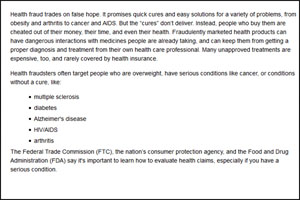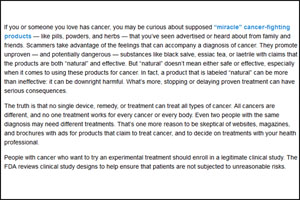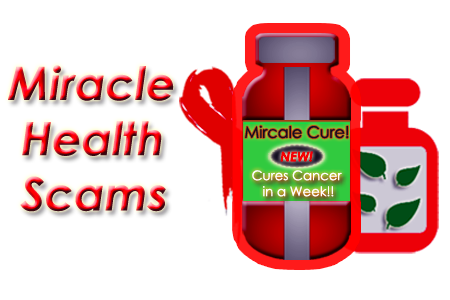Miracle Health Scams
Every year, several hundred thousand healthcare recipients fall victim to miracle health scams. According to a report by the Federal Trade Commission (FTC), victims lose billions of dollars on drug supplements falsely claiming to cure various ailments. Scam operations frequently imitate legitimate medical authorities, healthcare foundations, and medical rehabilitation centers, using deceptive sales pitches like "This treatment cured my cancer in one week." While these scams offer false hope, they lack scientific backing and do not work. As with anything that sounds too good to be true, caution is necessary, as scammers are always looking for ways to take advantage of unsuspecting individuals. These unproven and
often useless treatments prey on people desperate for relief, often appearing in advertisements promoting "miracle drug supplements" that claim to cure a range of diseases and pains. From obesity and arthritis to cancer and AIDS, fraudulent health advertisements have become widespread. At best, these so-called cures hold no value. At worst, they pose serious health risks. The most terrifying aspect of these scams is that they can be life-threatening, putting patients in danger by discouraging them from seeking real, effective medical treatment.
Miracle health scams involve deceptive tactics that promote false or exaggerated health products with unrealistic promises. Scammers capitalize on the desire for quick fixes, offering instant cures without any credible scientific backing. They often highlight secret ingredients, fake testimonials, and create urgency by claiming limited availability. Pseudo-scientific language is frequently used to mislead consumers into believing in the efficacy of these fraudulent treatments. To protect oneself, individuals should always consult healthcare professionals before considering new treatments, verify claims with scientific evidence, research product ingredients, check independent reviews, and remain cautious of promises of rapid health improvements. Staying informed and skeptical is the best defense against health scams that prey on vulnerability and the pursuit of quick solutions.
False sales pitches like "validated by the world's top scientists" are often used to promote illegally marketed health supplements, which can trigger dangerous allergic reactions when combined with other medications. Adding to the deception, misleading promotions such as "cut costs with a Health Buy promo code" only serve to entice buyers further. These fraudulent schemes exploit confusion over healthcare reform, resulting in victims losing their wealth, time, and most critically, their health. 

Red flags to watch out for :
There are no shortcuts to a hale and hearty life. Every time you make progress, it can feel like something is pulling you back. In one way or another, false hope can be misleading, and certain drugs or treatments can drain optimism. Be skeptical when you hear:
? Miracle cure
? Quick fixes
? Ancient remedy
? Secret ingredient
? All natural
? Scientific breakthrough
? One product does it all
? Personal testimonials – Using untested case histories from so-called satisfied patients
Depending on the individual's medical condition, these highly expensive and unapproved healing treatments can sometimes cause adverse health effects. Since they are rarely covered by insurance companies, miracle health foundations often target people who lack health insurance, exploiting their desperation for treatment.
Who are targeted?
The con artists behind mass-marketed scams are constantly devising new ways to target emotionally vulnerable individuals with conditions that have no cure—whether through post, email, or text—but two key points remain unchanged: they are only after your money, and their promises are completely false.
Scammers frequently target individuals who are overweight or suffer from serious, irremediable conditions such as:
? Multiple sclerosis
? Diabetes
? Cancer
? Alzheimer's disease
? HIV/AIDS
? Arthritis
Beyond these conditions, scammers also exploit concerns related to baldness, impotence, and aging, falsely claiming their "miracle cures" can treat these issues as well. Numerous videos online aim to expose the reality of these fraudulent health schemes, safeguard consumers from financial loss, and warn against deceptive claims that can ultimately put one's health at risk.
Miracle health scams primarily prey on vulnerable individuals—those seeking solutions for chronic illnesses, looking into alternative treatments, or desperate for relief. Elderly individuals, often navigating age-related health challenges, may be particularly susceptible. Terminally ill patients, seeking any possible treatment, can also fall victim to scams promising false hope. Weight loss seekers looking for rapid solutions, individuals with limited health literacy, and those struggling with mental health are common targets. Parents seeking treatments for sick children and those interested in alternative medicine should also exercise caution. To protect against miracle health scams, individuals should approach health claims with skepticism, consult healthcare professionals, verify scientific evidence, research product ingredients, check independent reviews, and remain cautious when encountering advertisements promising rapid health improvements. Staying informed and skeptical is essential to avoiding deceptive health scams that prey on desperation and the pursuit of quick solutions.
Report Scams :




